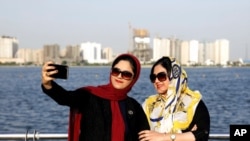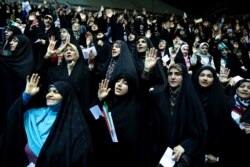An Iranian anti-hijab activist who fled Iran after being sentenced to 12 years in prison is now facing deportation while detained in a repatriation center in Turkey.
Nasibeh Shemsai, 36, was arrested at Istanbul Airport on November 5 as she attempted to take an Italy-bound flight using a fake passport to reunite with her brother in Spain.
She was initially taken to a police station in Istanbul, then was transferred to a repatriation center in Edirne, a border province in northwestern Turkey, where she could be sent back to Iran.
Anti-hijab protests
An architect by occupation and a mountaineer, Shemsai in 2018 climbed Iran’s highest peak, Mount Damavand, and took off her scarf in a picture in solidarity with “the Girls of Enghelab [revolution] Street” who participated in protests against Iran’s compulsory hijab in 2017.
Shemsai was also seen in a “White Wednesdays” video, in which she was handing out white flowers to women passengers in the Tehran metro to show solidarity with Nasrin Sotoudeh, a prominent human rights lawyer who was recently granted a temporary leave from prison for health reasons.
"White Wednesdays" is a social media campaign against Iran’s forced headscarf law.
In May 2019, Shemsai was arrested by the Iranian regime on various charges, including anti-regime activities and insulting sacred values in Islam. After six months in detention, the court released her on parole.
Last May, Shemsai reportedly went to an Iranian prosecutor’s office, only to have her identification documents and personal belongings confiscated by the Revolutionary Guard. She was told at the prosecutor’s office about an impending 12-year prison sentence, prompting her to flee to neighboring Turkey through smugglers.
International protection
In Istanbul, she obtained a fake passport from a human smuggler to leave Turkey to reunite with her brother in Spain, according to her lawyer. Her November 5 arrest and detention sparked a widespread social media campaign by Iranian and Turkish activists demanding that Turkey allow her to stay in the country.
Turkey's Directorate General of Migration Management (DGMM) said legal proceedings were continuing against Shemsai. A press release noted that as of Monday she had not requested international protection from Turkey.
Because of a geographical limitation to the Geneva Conventions, Turkey grants refugee status only to individuals from Council of Europe member states. By that measure, Turkey registers non-Europeans as international protection applicants.
According to the DGMM figures, 3,588 Iranians applied for international protection in Turkey last year.
Previous deportations
Peyman Aref, an Iranian journalist based in Brussels, said for many Iranians such as Shemsai, Turkey is not a safe destination because of alleged cooperation between Iranian and Turkish authorities.
“Turkey and Iran have close intelligence cooperation. Turkey handed over many Iranian activists to Iran in recent years,” Aref told VOA, referring to the deportations of Mohammad Rajabi and Saeed Tamjidi.
The Turkish Foreign Ministry did not respond to VOA’s request for comment on these allegations.
Rajabi, 26, and Tamjidi, 28, participated in November 2019 anti-government protests in Iran. After initially being arrested and released, they fled to Turkey to seek asylum. However, they were detained by Turkish authorities and deported to Iran, where they were immediately arrested and sentenced to death last February.
The Iranian Supreme Court upheld their death sentences last July but suspended the executions pending a retrial.
Shemsai’s Istanbul-based lawyer, Ugur Ozdemir, told VOA that his client applied for international protection in Turkey on Tuesday while being held in the repatriation center.
Ozdemir said the previous deportation of Iranian activists who had applied for international protection dissuaded Shemsai from seeking refuge from Turkish authorities immediately after crossing the Iranian border.
Non-refoulement
Some human rights organizations say Turkey needs to abide by the non-refoulement principle of refugee protection regardless of geographical limitation. Non-refoulement forbids the return of a person to a country where he or she may face persecution.
“Even if only one person is forcibly deported, it is a sufficient reason for others to feel unsafe here,” Tarik Beyhan, the campaigns and communications director of Amnesty International’s Turkey office, told VOA.
Beyhan said his organization recognizes Turkey’s role in hosting about 4 million refugees. However, “it does not mean that it is possible to accept any violation of human rights, international standards and non-refoulement principle, even if it happens once.”
Increased cooperation
Some experts say that the recent increase in cooperation between Iran and Turkey on foreign and security policy has prompted harsher treatment of Iranian refugees in Turkey.
Last September, Turkish President Recep Tayyip Erdogan and Iranian President Hassan Rouhani held a virtual Turkey-Iran High-Level Cooperation Council meeting in which they agreed to take steps together in the region in the interests of both countries, including joint operations against militant groups such as the Kurdistan Workers' Party (PKK) and its Iranian wing, PJAK.
Both the PKK and PJAK are designated terrorist organizations by the United States and Turkey.
“As Turkish and Iranian leaders find greater common ground to join forces, there are also greater risks for Iranian nationals who have taken refuge in Turkey,” said Aykan Erdemir, the director of the Turkey Program at the Foundation for Defense of Democracies and a former Turkish parliamentarian.
“The latest wave of deportations indicates that the Turkish government is likely to grant the Iranian regime greater room for maneuver in cracking down on dissidents,” Erdemir told VOA.






